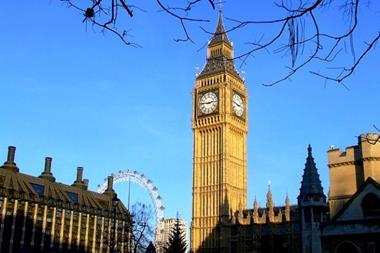Ministers are looking at how to help businesses hit hardest by April’s change to business rates, the prime minister confirmed today, as pressure mounts on the government to take action.
Theresa May said in Prime Minister’s Questions that chancellor Philip Hammond and communities secretary Sajid Javid were looking at how to help businesses affected most by rates rises with “appropriate relief”.
Her announcement comes after the mayor of London this week waded into the row on business rates with a warning that thousands of the capital’s small firms could be forced to shut.
Mayor Sadiq Khan said the capital was facing a £900m hike in business rates with more than 7,500 businesses expected to see a 45% jump in their bill in April.
His involvement comes as pressure mounts on the government to help up to one in three convenience stores that are expected to face increases when many internet distribution warehouses will see bills fall.
Khan said the hikes were misguided and, when combined with the uncertainty of Brexit, were a “double whammy for business in London”.
Khan has combined with The New West End Company, London Councils, the London Chamber of Commerce and Industry, the Federation of small Businesses in London, the Heart of London Business Alliance and other organisations to write to chancellor Philip Hammond arguing the scale and suddenness of the business rates hikes will have a negative impact on shops and other businesses.
The mayor believes the rise will have a particularly damaging impact on independents in areas such as Hackney and Islington where property values have increased dramatically.
He called for raising the current national £12,000 rateable value threshold, below which small businesses receive 100% rates relieve, to “a more realistic level” in London to mitigate the impact of the revaluation on small and medium-sized business.
Khan said he was “genuinely shocked the government’s actions would damage the prospects of so many businesses in the capital, putting many at risk of closure”.
The character of local high streets was under threat, he said. “This is the last thing that London businesses need and will serve as a kick in the teeth for tens of thousands of companies in the capital who are still digesting the recent vote to leave the European Union.”
Meanwhile, the Association of Convenience Stores is among a group of organisations representing more than 100,000 businesses calling for action on business rates in the following areas:
- Changing the system so that it incentivises business to invest instead of deterring them
- Increasing the frequency of revaluations to deliver more accurate rates bills
- Ensuring that businesses can receive a fair hearing when their rating assessments are incorrect
- Reducing the overall burden on businesses through effective transitional relief and linking the multiplier to CPI before 2020
The signatories to the letter are:
James Lowman, Chief Executive
Association of Convenience Stores
Kate Nicholls, Chief Executive
Association of Licensed Multiple Retailers
Brigid Simmonds OBE, Chief Executive
British Beer and Pub Association
Mike Spicer, Director of Research and Economics
British Chambers of Commerce
Ufi Ibrahim, CEO
British Hospitality Association
Melanie Leech CBE, Chief Executive
British Property Federation
Helen Dickinson OBE, Chief Executive
British Retail Consortium
Josh Hardie, Deputy Director General
Confederation of British Industry
Ross Murray, President
Country Land and Business Association
Martin McTague, National Policy Director
Federation of Small Businesses
Edward Cooke, Chief Executive
Revo




















No comments yet